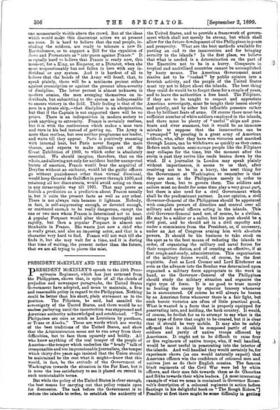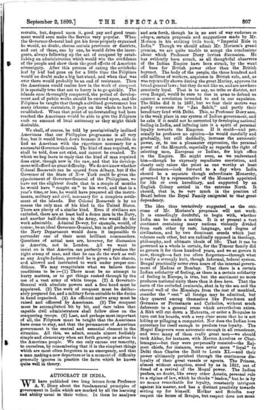PRESMEVT 314sEINLEY AND THE PHILIPPINES.
pRESIDENT MoKINLETS speech to the 10th Penn- sylvania Regiment, which has jest retttrned from the Philippines, shows that, in spite of all the clouds of prejudice and newspaper paragraphs, the United States Government have adopted, and mean to maintain, a firm and reasonable policy in regard to the Philippines. Nothing could be better than his short, plain statement as to the position. The Filipinos, he said, had assailed the sovereignty of the United States, and there would be no useless parleying until the insurrection was mappressed and American authority acknowledged and established. "The Philippines are ours as much as Louisiana by purchase, or Texas or Alaska." These are words which are worthy of the best traditions of the United States, and show that the Administration mean not to run away from their difficulties, but to face them squarely and boldly. All who knew anything of the real temper of the people of Americas—the temper which underlies the "heady talk of irresponsible and too impressionable journalists, the temper which thirty-five years ago insisted that the Union should be maintained be the cost what it might—knew that this would, in fact, be the attitude of the Government of Washington towards the situation in the Far East, but it is none the less satisfactory to see it placed an record in such unmistakable terms.
But while the policy of the United States is clear enough, the best means for carrying out that policy remain open for discussion. The task before the Government is to reduce the islands to order, to estabheh the authority of the United States, and to provide a framework of govern. ment which shall not merely be strong, but which shall allow for the future development of the Philippines in peace and prosperity. What are the best methods available for putting an end to the insurrection and for bringing security to the islands ? In the first place, we believe that what is needed is a. determination on the part of the Executive not to be in a hurry. Conquests in tropical and uncivilised countries cannot be accomplished by hasty means. The American Government must resolve not to be "rushed" by public opinion into a feverish activity, and the people of the United States must try not to fidget about the islands. The best thing they could do would be to forget them for a couple of years, and to leave the authorities a free hand. The Filipinos, if they are to be taught to respect and appreciate American sovereignty, must be taught their lesson slowly and quietly, and by sober but inflexible pressure rather than by brilliant feats of arms. Of course there must be a sufficient number of white soldiers employed in the islands, and there must be plenty of "useful " ships and guns boats and river steamers, but it would be an immense mistake to suppose that the insurrection can be " swamped " by pouring in a great army of American soldiers, who, after they have won victories and marched through Luzon, can be withdrawn as quickly as they came. Before such tactics semi-savage people like the Filipinos may collapse for the time, but the moment after the storni is past they revive like reeds beaten down by the wind. If a journalist in London may speak plainly without impertinence, it seems to us that, after resolving not to be in a hurry, the next thing for the Government at Washington to remember is that they are not in the Philippines merely in order to conquer them, but to govern them. The soldiers and sailors must no doubt for some time play a very great part, but there is also need for a civil Government which shall be the predominant partner. In our opinion, a civil Governor-General of the Philippines should be appointed with complete powers of direction and control over all military and naval officers acting in the islands. This civil Governor-General need not, of course, be a civilian. He may be a soldier or a sailor, but his post should be a civil post, and he should act in a civil capacity and. under a commission from the President, or, if necessary, under an Act of Congress arming him with absolute powers. It should be his business to take stock on the spot as to the best means of reducing the islands to order, of organising the military and naval forces for their respective duties; and of creating an effective, if at first rough-and-ready, administration. This organisation of the military forces would, of course, be the first requisite. Just as Lord Cromer and Lord Kitchener as soon as the advance into the Soudan was determined upon organised a military force appropriate to the work in hand, so the Governor - General of the Philippines should study the military situation and organise the right type of force. It is no good to trust merely to beating the enemy by superior bravery whenever he is encountered. Of course he will always be beaten by an American force whenever there is a fair fight, but such heroic victories are often of little practical good. What is wanted is a force that is properly equipped for penetrating into, and holding, the back country. It would, of course, be foolish for us to attempt to say what is the exact type of force that ought to be created, but it is clear that it should be very mobile. It may also be safely affirmed that it should be composed partly of white soldiers and partly of native troops officered by Americans., It ought not to be difficult to raise four or five regiments of native troops, who, if well handled, would be most useful in penetrating into the interior of the islands. And well handled they would certainly be, far experience shows (as one would naturally expect) that American officers win the confidence of coloured men and natives just as do their English cousins. The famous black regiments of the Civil War were led by white officers, and their men felt towards them as do Ghoorkaa and Sikhs towards their white leaders. [A most interesting example of what we mean is contained in Governor Roose- velt's description of a coloured regiment in action before Santiago in his delightful book on "The Rough Riders."] Possibly at first there might be some difficulty in getting recruits, but, depend upon it, good pay and good treat- ment would soon make the Service very popular. When the Governor-General had got his force properly organised he would, no doubt, choose certain provinces or districts, and out of these, one by one, he would drive the insur- gents, always following up the act of conquest by estab- lishing an administration which would win the confidence of the People and show them the good effects of American sdvereignty. After this process of eating the artichoke leaf by leaf had gone on for a little time the Filipinos would no doubt make a big last stand, and when that was over there would probably be an end of resistance. Then the Americans would realise how in the work- of Conquest it is specially true that not to hurry is to go quickly. The islands once thoroughly conquered, the period of develop- ment and of public works should be entered upon, and the Filipinos be taught that though a. civilised government has many irksome restraints, it pays on the whole to have it established, When that point of understanding had been reached the Americans would be able to give the Filipinos such an amount of local autonomy as they might think desirable.
We shall, of course, be told by pessimistically inclined Americans that our Philippine programme is all very fine, but it would break down because it is not possible to find an American with the experience necessary for a successful Governor-General The kind of man required, we shall be told, does not exist, and cannot be created. To which we beg leave to reply that the kind of man required does exist, though now in the raw, and that his develop- ment will afford no great difficulty. We do notknow whether Colonel Roosevelt can be spared from Albany, but if the Governor of the State of New York could be given the appointment of Governor-General of the Philippines, we have not the slightest doubt that in a couple of months he would have "caught on to his work, and that in a. year's time, or less, he would have prepared all the instru- ments, military and civil, necessary for a Complete settle- ment of the islands. But Colonel Roosevelt is by no means the only man of his kind in the United States. There are plenty of a similar kind Even if civilians are excluded, there are at least half a dozen men in the Navy, and another half-dozen in the Army, who would do the work admirably. Admiral Dewey, for example, would, of course, be an ideal Governor-General, but in all probability the Navy Department would deem it impossible to surrender one of their most brilliant commanders. Questions of actual men are, however, for discussion in America, not in London. All we want to insist on is that America can perfectly well produce the right stamp of man, and that he can do the work as well as any Anglo-Indian, provided he is given a, fair chance, and allowed and instructed to work under proper con- ditions. We may recapitulate what we believe thoee conditions to be :—(1) There must be no attempt to hurry matters, or to get things rushed through by the use of a vast army of white troops. (2) A Governor- General with absolute powers and a, free hand must be appointed, (3) The work of conquest must be deliber- ately prepared for, and a military force suitable to the duties in hand organised. (4) An efficient native army must be raised and officered by Americans. (5) The conquest must be accomplished bit by bit, and dare taken that capable civil administrators shall follow *lose on the conquering troop. (6) Last, and perhaps most important of all, the Filipinos must be taught that the Americans have come to stay, and that the permanence of American government is the central and essential element in the situation. All this, we admit, sounds almost foolishly simple and elementary when set forth gravely as advice to the American people. We can only excuse our temerity, to ourselves, by remembering that it is the simplest things which are most often forgotten in an emergency, and that a. man making a new departure or in a moment of difficulty generally ignores in practide the facts which he knows quits well in theory.



































 Previous page
Previous page